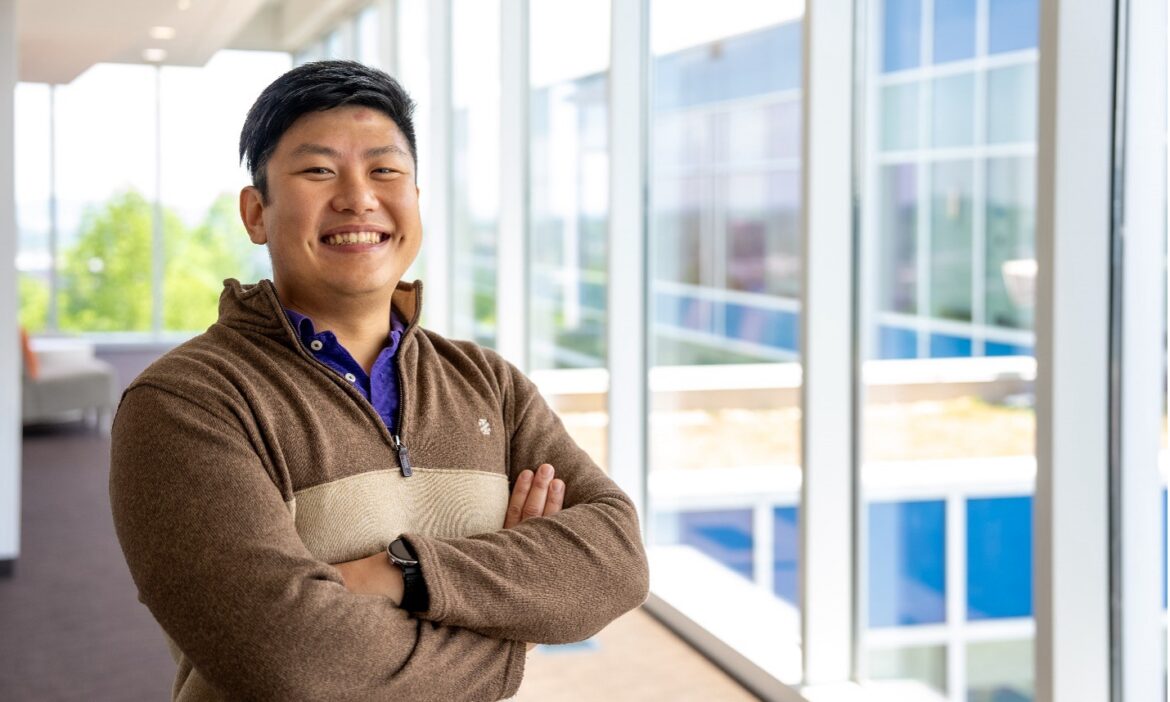Chen Zhang, member experience specialist on the BlueCross brand management team, answers a few questions and talks about his childhood experience immigrating to the U.S., as well the inspiration behind his work and passion for improving service and accessibility for our members.
Tell us about yourself and your role at BlueCross.
Chen: I’ve been at BlueCross since 2019 and I work in connecting insights that we have about our members — collected through research, analytics and industry data — and come up with recommendations for improvements for our member experience.
So a lot of what I do is translate the data to something that resolves a challenge a business partner may have, or taking the goals that a business partner has, like improving enrollment in a program, for instance, and then going to our research team to figure out what data to go look for that could help answer that question.
A lot of it is connecting and translating member needs into how we’re serving them as a business and translating a business need to communicate that with a member.

Reflecting on your experiences growing up, are there any moments that stand out as shaping your perspective?
Chen: I came here from China at 9 years old with my mom and stepdad. We lived on Long Island in a town called Great Neck, which is actually where “The Great Gatsby” was set.
I didn’t speak English when we arrived. I’d watched “Inspector Gadget” and some Disney movies, and I knew a few choice phrases from “Terminator 2” that are not exactly appropriate for polite conversation, but as a kid, I was just excited to be going to a new place. But I think America plays a role in the imagination of a lot of people as this great place to go.
I remember walking around New York City at night as a kid and seeing the glitter of the crushed-up quartz in the pavement and thinking, “Wow, they paved the streets with diamonds.”
Interestingly enough, there’s a sizeable Asian population in Great Neck — about 30% of my school was Asian, which was a mix of students who were descendants of immigrants from generations back as well as students who immigrated here from various Asian countries in high school. It was interesting to see that variety among my peers based on what age they came to this country and how that affected their outlook.
But one of the great things about having an immigrant experience is that there are certain commonalities and bonds that you share with other immigrants, regardless of where we’re from. I don’t think I would have had a more multi-cultural experience if I hadn’t moved to the U.S. It’s because of moving here that I got to meet and interact with more cultures than if I’d stayed in China. I got to share that experience with a lot of my friends, and I remember talking with them about the tension between holding on to your native language vs. adapting to and adopting the culture you’ve immigrated into.

What has that journey looked like for you?
Chen: At this point in my life, my English is better than my Chinese. My wife isn’t Chinese and doesn’t speak it, but we decided early on that we wanted to raise our daughters in a bi-lingual household. That’s been remarkably difficult.
My parents live in China now but speak English fluently, and when the kids say something to them in English, they’ll fold immediately and start speaking English to them! [laughs]
Luckily, with streaming options, it’s actually very easy to get Chinese dubbing on American media. So when I give my kids a little screen time, I try to put that in Chinese so they still get some exposure to the language. It’s kind of the opposite of my childhood in China watching American media in English!
You talked about your job centering around kinds of translation. Do you think your life experience has an impact on the way you approach your work?
Chen: I do! I think a common thread through basically all my life and my approach to interacting with people has been that you have to be open-minded. You have to be aware of differences that exist and understand that there’s a layer of differences and interactions from people’s experiences. But there’s a deeper level too where you have fundamental experiences that we all share and strive for. I think ultimately that’s how we treat people fairly and really serve them.
Speaking of preconceived notions, are there any that you’ve had to dispel when meeting or talking to people?
Chen: I think the biggest challenge is addressing what or who people think I am versus who I actually am. Being Chinese or an immigrant or American isn’t usually the first identity that I carry within me. But when people see me and that’s the only thing they have to go on, that’s often the thing they’re most curious about.
I think this goes back to your first question: Who am I?
So if you ask me who I am: I’m a dad. I take my kids to the park and enjoy chasing them around. I wake up early on the weekends to watch soccer. I play tabletop games with friends. I act in plays. Those are the things I want people to know about me.


 A graduate of The University of South, Sewanee, Jacob joined the Corporate Communications team in 2018. With a background in marketing, public relations and literary publishing, he brings storytelling expertise and a collaborative spirit to every project.
A graduate of The University of South, Sewanee, Jacob joined the Corporate Communications team in 2018. With a background in marketing, public relations and literary publishing, he brings storytelling expertise and a collaborative spirit to every project.